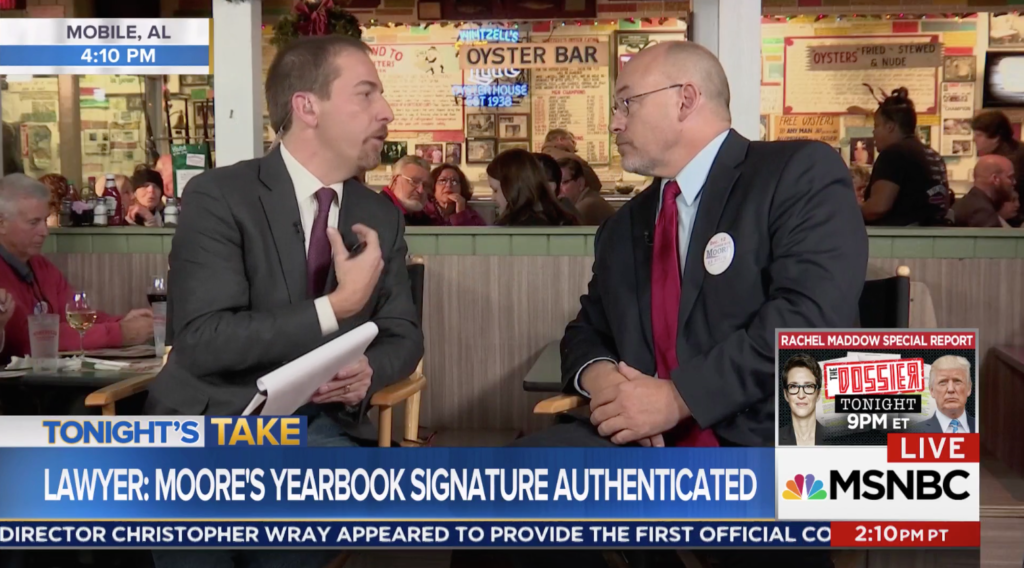MSNBC’s Chuck Todd takes show to Alabama ahead of Tuesday’s special election

With just four days to go before the special election, MSNBC’s Chuck Todd took “MTP Daily,” a spinoff of the Sunday show “Meet the Press,” on the road to Alabama Friday ahead of the state’s Tuesday Senate race. “It’s snowing heavily in Alabama, really, and that’s nowhere near the craziest thing that’s happening here,” said Todd from Wintzell’s Oyster House in downtown Mobile, Ala. introducing the show. There, he sat down with several guests to discuss the heated race between Republican Roy Moore and Democrat Doug Jones. Todd sits down with Dean Young His first guest of the show was Dean Young, campaign strategist for Roy Moore. Young told Todd that Moore will help the country “get back to the Constitution and godly principles that made this country great” and he has “no doubt” his candidate will win on Tuesday. “How does he effectively serve in the United States Senate, when his fellow republican senator, if he gets elected, Richard Shelby, didn’t won’t to vote for him, said he wrote somebody in. Mitch McConnell doesn’t want him there. I’d say at least half of the Republican Senate conferences on the record, saying they want to see him potentially expelled from the Senate. How can he represent Alabama effectively?” Todd queried. “He’ll be effective,” Young responded. “Look at what’s happening now, so when he goes up to Washington, they count on him standing for what’s right, what’s just and what’s fair.” When pressed whether or not he had any doubt as to whether Moore would win, Young simply answered, Nope.”
Bradley Byrne: Getting results for locally owned businesses

When I ran for Congress, I made clear that I wanted to be a workhorse, not a showhorse. That means my focus has been on actually getting results instead of just talking about problems. We were able to get a big result last week when the House passed my bill, the Save Local Business Act. The legislation came about after I heard concerns from multiple locally owned businesses. I’ve sat down in local restaurants and heard firsthand from hardworking men and women who took time away from their business to travel to Washington and urge Congress to address issues caused by something known as the “joint employer” standard. So, what is the issue exactly? For decades, there was a commonsense legal test that determined when two or more separate businesses could be considered joint employers and held jointly responsible for the same group of employees. Employers had to share “direct” and “immediate” control over essential terms and conditions of employment. As a former labor and employment attorney who practiced in this area for decades, I can assure you that this was the standard that everyone knew and appreciated. Unfortunately, in 2015, the activist National Labor Relations Board (NLRB) issued a ruling in Browning-Ferris Industries that upended this cornerstone of federal labor law and created a vague and unworkable new joint employer policy. Making matters even worse and more complicated, federal agencies then incorporated the new standard in their regulatory agenda. Under this new standard, two independent businesses can be considered joint employers if they make a business agreement that “indirectly” or “potentially” impacts their employees. Just think about the uncertainty and ambiguity this standard could cause. It’s hard enough for labor attorneys to even agree on what exactly it means to have “indirect” or “potential” control over an employee. Imagine how confusing it is for Main Street businesses to understand and follow. Bob Omainsky, the owner of Wintzell’s Oyster House, had this to say about the confusion caused by the new joint-employer standard: “If we hire an outside landscaping company to keep our lawns lush, I could be considered a joint employer if I show the landscapers where to mow. Or, if I contract a food supplier for certain ingredients, I could become part of a lawsuit if one of their workers complains about overtime pay. The uncertainty is nothing more than governmental overreach that is crippling eateries like Wintzell’s and discouraging growth throughout the restaurant industry.” Workers shouldn’t have to wonder who their employer is. They deserve better than a vague and confusing rule that the American Action Forum found threatens 1.7 million jobs. Even the Progressive Policy Institute issued a statement saying that the expanded standard “may do more harm than good.” My legislation earned support from both Republicans and Democrats when it passed the House last week. This is a bipartisan issue because it isn’t about politics. Instead, it’s about saving jobs and supporting locally owned businesses. Despite scare tactics from Big Labor bosses and their trial lawyer buddies, I want to make one thing perfectly clear: this legislation does not remove a single worker protection. All worker protections provided by the National Labor Relations Act, the Fair Labor Standards Act, and the Equal Pay Act remain unchanged and are still available. Ultimately, my bill is about providing clarity to workers and job creators. It is about protecting the rights of workers and ensuring employers have clarity on their responsibilities to employees. I was proud to see the bill pass out of the House last week, and I am going to continue focusing on getting results for the people of Southwest Alabama. • • • Bradley Byrne is a member of U.S. Congress representing Alabama’s 1st Congressional District.
Bob Omainsky: Alabama’s Bradley Byrne champions critical joint employer fix

In the South, we love football, family, and food — especially here in Alabama where we have one of the most decorated football teams in the country, family gatherings are our favorite time of the week, and our food is tasty and soulful. There is no better way to bring football, family, and food together than at your favorite local restaurant. Our restaurants are as spirited and rich as our traditions. Some have been in families and communities for generations while others have developed from new and fresh ideas. But one thing that each has in common is the vital role they play in our economy. Restaurants contribute to job creation and economic growth while providing essential workforce development opportunities. They’re where employees build skills that shape their future success. They serve as pillars within their communities and are a driving force not just for Alabama’s economy, but for the nation’s economy. Alabama has 7,845 eating and drinking locations that employ 185,300 people and contribute $8.1 billion in economic output. I find it troubling that any national policy would aim to hinder, or even eliminate, the industry’s growth potential. Unfortunately, a National Labor Relations Board (NLRB) decision to expand the joint employer definition did just that in 2015. Joint employer is the standard by which two or more businesses share control of an employee. Before 2015, business owners had a clear understanding of when they might be liable for another company’s employment actions. The long-established standard held that you must have “direct” and “immediate” control over another company’s workers. Under the new rule, it’s not as simple. Today’s definition is drastically-expanded, putting restaurants at legal risk with only the vaguely defined “indirect” or “potential” control over another company’s employees. Neither attorneys nor human resources professionals can agree on the scope of these terms — leaving business owners with little recourse but to buy more expensive and protective insurance and to reevaluate many of their business relationships altogether. Take, for instance, my nearly 80-year-old business, Wintzell’s Oyster House. If we hire an outside landscaping company to keep our lawns lush, I could be considered a joint employer if I show the landscapers where to mow. Or, if I contract a food supplier for certain ingredients, I could become part of a lawsuit if one of their workers complains about overtime pay. The uncertainty is nothing more than governmental overreach that is crippling eateries like Wintzell’s and discouraging growth throughout the restaurant industry. Thankfully, Alabama’s own Rep. Bradley Byrne has introduced bipartisan legislation that aims to roll back this confusing joint employer ruling and provide some much-needed clarity for millions of restaurants across America. Rep. Byrne and the more than 50 co-sponsors of H.R. 3441, the Save Local Business Act, understand the importance of having federal policies that help businesses grow and thrive for the good of our entire workforce. On behalf of the 1,117 restaurants in Alabama’s 1st District that employ 22,259 men and women, I would like to thank Rep. Byrne for his continued leadership and his effort to clarify the joint employer issue. This is a critical measure because after all, a stable employer environment will only make our restaurants that much better at bringing together football, family, and food for generations to come. ••• Bob Omainsky is owner-operator of Wintzell’s Oyster House, with three locations in the Mobile, Ala. area.

